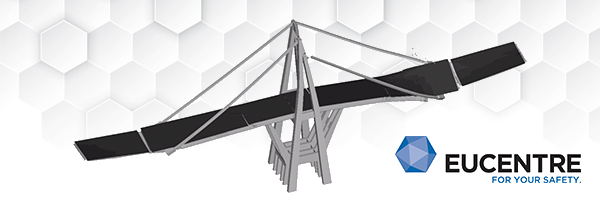Un nuovo video, che riporta i risultati delle modellazioni di possibili sequenze di collasso del Ponte Morandi di Genova, aggiornato agli studi di febbraio scorso, è stato pubblicato oggi su YouTube.
Gli studi – che hanno coinvolto ricercatori di Eucentre, di due società di ingegneria (Studio Calvi e Mosayk di Pavia), di due università italiane (IUSS e Università di Pavia) e di una università americana (University of Washington, Seattle) – in fase di pubblicazione sulla rivista Journal of Performance of Constructed Facilities della American Society of Civil Engineers, hanno portato ad ipotizzare scenari ulteriori rispetto a quello mostrato nel video precedente, a seguito dell’analisi dei documenti reperiti grazie all’accesso all’Archivio Morandi, facente parte dell’Archivio Centrale dello Stato.
Nel video pubblicato oggi (visionabile all’indirizzo https://youtu.be/4P-PRBBA0eI) vengono mostrati i risultati ottenuti fino allo scorso febbraio.
Ponte Morandi: pubblicato il video delle modellazioni di possibili sequenze di collasso aggiornato agli studi di febbraio 2019

 Eucentre è una Fondazione di diritto privato senza scopo di lucro che persegue una missione di ricerca, formazione e erogazione di servizi nel settore dell’ingegneria sismica e, più in generale, dell’ingegneria della sicurezza
Eucentre è una Fondazione di diritto privato senza scopo di lucro che persegue una missione di ricerca, formazione e erogazione di servizi nel settore dell’ingegneria sismica e, più in generale, dell’ingegneria della sicurezza  Eucentre promuove Scienza, Ricerca e Innovazione a beneficio della collettività, offrendo metodologie mirate e soluzioni concrete per prevenzione, sicurezza e resilienza. Collabora con istituzioni e imprese, diffondendo competenze orientate al vantaggio comune.
Eucentre promuove Scienza, Ricerca e Innovazione a beneficio della collettività, offrendo metodologie mirate e soluzioni concrete per prevenzione, sicurezza e resilienza. Collabora con istituzioni e imprese, diffondendo competenze orientate al vantaggio comune. Eucentre conduce ricerche sull’ingegneria sismica e sulla riduzione del rischio attraverso test di laboratorio e analisi numeriche. L’obiettivo è migliorare il comportamento sismico delle strutture e dei terreni e sviluppare tecniche innovative antisismiche
Eucentre conduce ricerche sull’ingegneria sismica e sulla riduzione del rischio attraverso test di laboratorio e analisi numeriche. L’obiettivo è migliorare il comportamento sismico delle strutture e dei terreni e sviluppare tecniche innovative antisismiche  Eucentre conduce attività di ricerca su ingegneria sismica e riduzione del rischio, attraverso prove di laboratorio e analisi numeriche, per migliorare il comportamento sismico di strutture e terreni e sviluppare tecniche innovative di consolidamento antisismico.
Eucentre conduce attività di ricerca su ingegneria sismica e riduzione del rischio, attraverso prove di laboratorio e analisi numeriche, per migliorare il comportamento sismico di strutture e terreni e sviluppare tecniche innovative di consolidamento antisismico. La Fondazione promuove attività formative diversificate e di alta qualità, rivolte a contesti accademici e professionali, con programmi e iniziative costantemente aggiornati e innovativi per rispondere alle esigenze in continua evoluzione del settore e della società
La Fondazione promuove attività formative diversificate e di alta qualità, rivolte a contesti accademici e professionali, con programmi e iniziative costantemente aggiornati e innovativi per rispondere alle esigenze in continua evoluzione del settore e della società  Eucentre assicura una comunicazione per informare istituzioni, professionisti e cittadini sulle attività e i progetti in corso, con l’obiettivo di diffondere contenuti e conoscenze utili e accessibili a tutti. Contribuisce a promuovere una cultura della prevenzione e della resilienza, condivisa e consapevole.
Eucentre assicura una comunicazione per informare istituzioni, professionisti e cittadini sulle attività e i progetti in corso, con l’obiettivo di diffondere contenuti e conoscenze utili e accessibili a tutti. Contribuisce a promuovere una cultura della prevenzione e della resilienza, condivisa e consapevole.